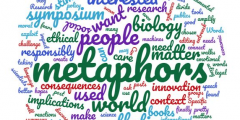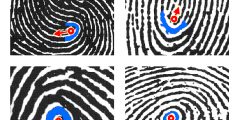Science and Metaphors
April 1, 2019
Today I gave a lecture on responsible innovation and responsible language use (via Skype) to biochem and synbio students at the University of Oxford. After the lecture, one student asked whether there was a good go-to book on science and metaphor. I hummed and hawed…. There is of course some stuff, but not a really …
Talking organelles: A riot of metaphors
March 22, 2019
A few days ago, somebody tweeted an article on organelles and somebody else tweeted an article on how worms regenerate their bodies. I was just in a slump of Brexit malaise when I saw this and thought, “oh, there is life outside Brexit at least in worms and cells”. So, I started to read an …
Why we should care about the language we use in science
December 7, 2018
This post first appeared in the ‘On Society’ blog at BioMed Central and is reposted here with permission. *** Brigitte Nerlich and Carmen McLeod at the Synthetic Biology Research Centre at the University of Nottingham have given ‘Responsible Research and Innovation’ a new twist, by focusing on responsible language use. As everybody knows by now, words matter in politics as …
Climate change metaphors: Crimes, detectives and fingerprints
October 27, 2018
For quite a few years I have written about metaphors in climate change, such as the metaphors of the greenhouse and the footprint. There is one metaphor I overlooked, and that is the one of the ‘fingerprint’. While the carbon footprint metaphor was used in order to get people to act on climate change, making them …
Groundhog day in the hothouse
August 11, 2018
On 6 August Will Steffen and others published a paper entitled “Trajectories of the Earth System in the Anthropocene”. The paper explores “the risk that self-reinforcing feedbacks could push the Earth System toward a planetary threshold that, if crossed, could prevent stabilization of the climate at intermediate temperature rises and cause continued warming on a …
Data harvesting: A metaphor ripe for scrutiny
April 27, 2018
At the end of March news of a data scandal broke – you all know which one. As Steven Poole in The Guardian wrote: “The political data firm Cambridge Analytica has been accused of unauthorised ‘data harvesting’ from millions of Facebook accounts. This handily avoids allegations of ‘theft’ or even just ‘mining’”. Data harvesting is not only …
Catching a metaphor on the fly: ‘Greenfield genome design’
February 9, 2018
A week ago, something interesting washed up in my twitter stream, something a metaphor collector like me had to pick up and inspect. Andrew Hanson, an expert in metabolic engineering working at the University Florida, tweeted: “Excellent short 2016 piece from @claudiaevickers on #synbio platforms & the future of the microbial cell factory industry. Coins …
Genome editing: Invisible mending
December 1, 2017
Last week I had a few days in Oxford to visit old haunts, such as the Ashmolean, the Museum of Natural History and the Pitt Rivers Museum. I also went to a little exhibition in the basement of the Museum of the History of Science. The exhibition by Anna Dumitriu was entitled BioArt and Bacteria. …
Science and metaphor: Some historical perspectives
October 13, 2017
Over the last thirty years or so I have written about metaphor and its importance to language, thought and social interaction. In the last fifteen years, I have focused in on the relation between metaphor and science, especially science communication. However, only recently has it dawned on me how little I actually understand about metaphor …
Metaphors for many goals: Discussing research in interactional settings
July 28, 2017
This is a guest post by Rony Armon, a Research Assistant at the School of Education, Communication and Society King’s College London, specialising in Communication and Media, Qualitative Social Research, and History of Science. *** In a recent post Brigitte Nerlich reviewed some studies that seemed to suggest that even though metaphors are rampant in scientific discourse …
Subscribe by email
About this blog
This blog promotes discussion of topics related to the research programme 'Making Science Public: Challenges and Opportunities'. Our purpose is not to 'make science public'. Instead, we want to study the opportunities that have emerged for science to be more openly practiced and debated, but also the challenges posed by making science public or by promoting the making public of science as a solution to a variety of problems in society and in politics.
This blog will report on these and other issues related to the Leverhulme funded research programme: Making Science Public: Challenges and Opportunities
Useful links
Recent Posts
- Climate change and climate discourse: A dual disintegration
- Erving Goffman: Memories, method and metaphors
- Participation at the core: AI, ELSI and community engagement
- Understanding computational hermeneutics: Making meaning between the past and the present
- AI winter and AI bubble: Historical and metaphorical reflections
 MSP bookmarks
MSP bookmarks
- Twitter May 8, 2017
- Social innovations in Europe #RRI November 3, 2015
- Harvey Graff, the undisciplinarian September 20, 2015
- Replacing Pesticides With Genetics August 31, 2015
- Addressing hazardous chemicals in the circular economy August 25, 2015
Categories
- antibiotics
- anticipatory governance
- artifical intelligence
- big data
- biotechnology
- citizen science
- Climate Change
- Climate Politics
- co-production
- coronavirus
- Creationism
- Definition of Science
- designer babies
- disease
- disease
- engineering
- epigenetics
- Food Security
- Food sovereignty
- gene drive
- genomics
- GM Food
- GMOs
- history of science
- Hype
- images and visualisations
- imaginaries
- Immigration
- Impact
- infectious diseases
- innovation
- interdisciplinarity
- Knowledge Society
- Language
- Markets
- Metaphors
- microbiome
- neoliberalism
- Neuroscience
- open access
- Personal Reflection
- Politics
- Public education
- public engagement with science
- public needs
- public participation
- public policy
- public service
- publics
- regulatory science
- Religion
- Republican Party
- research impact
- responsible innovation
- responsive research
- Richard Dawkins
- risk
- Scepticism
- Science
- Science and Government
- science and politics
- Science and Songs
- science communication
- Science Communication
- Science Fiction
- Science Policy
- Social science
- sociology
- space
- space exploration
- synthetic biology
- transparency
- Trust
- Uncategorized
- Uncertainty
- visualisation
- wonder










